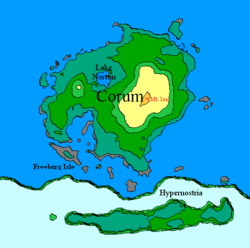Corum

| |
|
| |
| Total Area: | 6,012,720.85 km² |
| Area of major landmass: | {{{area_landmass}}} km² |
| Population: | >27,481,735 |
| Date founded: | 2001 |
| Countries: | 3 |
| Dependencies: | 0 |
| Languages: | English, Pallisican, Hammish |
| Largest Cities: | Wallis Island |
Corum is a continent on Micras.
Origin and Etymology
Corum was first added to the map of the MCS around 3.5.0 along with the rest of the Eastern Hemisphere. It was first called Jaiha, after the first nation to be founded upon it. Later, the Babkhans renamed it Lesser Eura, because it was close to but smaller than the Euran continent. It was finally named Corum in 2006 by St.Fenix.
It is speculated that Corum's depiction on the MCS map is based upon the map of the Federal Republic of Cyberia.
Landscape
The continent of Corum incorporates exactly thirty islands (including the rather large island of Hypernostria) plus mainland Corum. Six of these are occupied by New Zimia, eight are occupied by Stormark, three are claimed by Minarboria, while one each is claimed by Natopia and Calbion. New Zimia is the only nation which lays claim to the continent's mainland.
The center of the continent is dominated by the Riponian Mountains (othwerwise known as the Inner Desert), including the continent's highest peak, Mt. Isa (4200 m). These give way to foothills further north until eventually falling into a wide and extremely fertile plain drained by a number of rivers, along which stretch several somewhat prominent forests. Much of the southern areas of the continent and Hypernostria are icy tundra.
Corum is home to more than one major forests. Especially prominent are the Yasutomi Forest, in the western section of Yasutomi Isle, and Erlo Sinders Regional Forest, which occupies a vast stretch of the continent's northeast.
There is only one major body of freshwater on the continent, Lake Norton, which formed when Corum separated from the Eurani continent. Lake Norton serves as the primary entrance to the subterranean region known as The Corumian Underground (known locally as the Arterial Realm), a vast network of large caverns which serve as the home of the Braxian people.
Between Lake Norton and the Austral Strait lies Mount Bijaro, the second highest mountain on the continent.
Wildlife
Of all the continents of Micras, none has had its wildlife studied to the same extent as Corum. A region of extremely significant biodiversity, Corum is home to the largest catalogue of wildlife in the world.
Notable among Corum's native animal species is the Bijeko-Lisea-Nas, a top predator who's range extends across the heart of the continent, and the Eko-Adred-Eda, a huge bipedal amphibian. Notable plants include Adraso-Oname and Wutoi-Rabrev, both of which constitute agricultural exports of Passio-Corum.
Major institutions responsible for the study of Corum's wildlife include the University of Port Brent and the New Zimian Space Exploration and Settlement Agency. Using the data collected by these two organizations, it is possible to determine the exact type of flora and fauna which may be encountered in any given 12x12km area, anywhere in Corum. For example, using the data provided it is possible to determine that near the highest peak of Mt.Isa, travelers are likely to encounter fauna including Pui-Illt-Irf, Niha-Hial-Nas, and Eko-Adred-Eda, and flora including Pa-Rabrev, Tiji-Oname, and Alsay-Fiota. Further down the slopes it is possible to encounter a greater range of species, including animals such as Via-Adred-Irf, As-Illt-Irf, and Giid-Lisea-Eda, and plants including including Fuy-Rabrev, Wutoi-Rabrev, and Pev-Fiota.
History

Jaiha, a Middle-Eastern themed nation started by Thomas Cutterham was the first country to colonize Corum in 2002; it was soon joined by Korhal and the United Secular States. The first country of any lasting influence to inhabit the continent was Menelmacar, which had annexed Jaiha before 2003. A few Slobovian settlements existed in the east during late 2003 before all human habitation on the continent ceased. When people returned, they mostly settled the surrounding islands, which became centers of Stormarkian culture by Series 7. But the most important indigenous Corish nation was Riponia, which controlled the entire mainland save a Stormark enclave in the north for much of 2006 and 2007.
With the fall of Riponia, Corum was split between CIS, which held the old Riponian areas of the mainland; Stormark, which held its traditional island enclaves; and Craitland, which controled the three islands to the east of the continent.
From 2009 to 2011, the southern part of the continent was largely controlled by the Islamic Internet Republic. Following the collapse of the Islamic Internet Republic, the continent was defined as the home of the Lurk Federation, which laid claim to land in the continent's Western reaches, in the modern-day Realm of Redwood-Brugge.
Today the continent is the home of the Kingdom of New Zimia, the administrative headquarters of the Realm of Passio-Corum. New Zimia first claimed territory in Corum, in 2014. Since the establishment of the Kingdom of New Zimia, and the subsequent Pallisican expansion into the Realm of Bayen and Realm of Redwood-Brugge, Corum has enjoyed a prolonged period of relative peace, stability, and prosperity.
In 2020, Hazar is claimed south of Corum a bit be a constituent nation of Thraci Confederation. In May 2020, Hazar is expanded a bit. In November 2022, the Thraci Confederation disappeared.
The Islamic Internet Republic was restored on October 31, 2020 and later renamed to New Batavia. It claimed parts of its ancient lands on Corum. In addition, the following nations are claimants on the continent:
